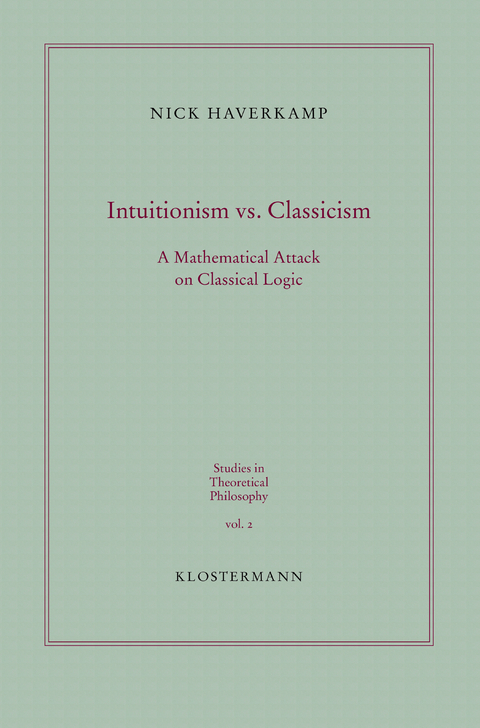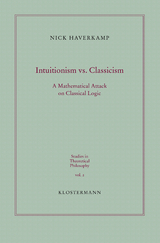Intuitionism vs. Classicism
A Mathematical Attack on Classical Logic
Seiten
2015
|
1., 2015
Klostermann, Vittorio (Verlag)
978-3-465-03906-8 (ISBN)
Klostermann, Vittorio (Verlag)
978-3-465-03906-8 (ISBN)
In the early twentieth century, the Dutch mathematician L.E.J. Brouwer launched a powerful attack on the prevailing mathematical methods and theories. He developed a new kind of constructive mathematics, called intuitionism, which seems to allow for a rigorous refutation of widely accepted mathematical assumptions including fundamental principles of classical logic. Following an intense mathematical debate esp. in the 1920s, Brouwer's revolutionary criticism became a central philosophical concern in the 1970s, when Michael Dummett tried to substantiate it with meaning-theoretic considerations. Since that time, the debate between intuitionists and classicists has remained a central philosophical dispute with far-reaching implications for mathematics, logic, epistemology, and semantics.
In this book, Nick Haverkamp presents a detailed analysis of the intuitionistic criticism of classical logic and mathematics. The common assumption that intuitionism and classicism are equally legitimate enterprises corresponding to different understandings of logical or mathematical expressions is investigated and rejected, and the major intuitionistic arguments against classical logic are scrutinised and repudiated. Haverkamp argues that the disagreement between intuitionism and classicism is a fundamental logical and mathematical dispute which cannot be resolved by means of meta-mathematical, epistemological, or semantic considerations.
In this book, Nick Haverkamp presents a detailed analysis of the intuitionistic criticism of classical logic and mathematics. The common assumption that intuitionism and classicism are equally legitimate enterprises corresponding to different understandings of logical or mathematical expressions is investigated and rejected, and the major intuitionistic arguments against classical logic are scrutinised and repudiated. Haverkamp argues that the disagreement between intuitionism and classicism is a fundamental logical and mathematical dispute which cannot be resolved by means of meta-mathematical, epistemological, or semantic considerations.
Nick Haverkamp ist wissenschaftlicher Mitarbeiter am Philosophischen Seminar der Universität Mainz.
| Erscheint lt. Verlag | 24.1.2015 |
|---|---|
| Reihe/Serie | Studies in Theoretical Philosophy ; 2 |
| Sprache | englisch |
| Maße | 155 x 235 mm |
| Gewicht | 429 g |
| Einbandart | kartoniert |
| Themenwelt | Geisteswissenschaften ► Philosophie ► Erkenntnistheorie / Wissenschaftstheorie |
| Geisteswissenschaften ► Philosophie ► Logik | |
| Geisteswissenschaften ► Philosophie ► Philosophie der Neuzeit | |
| Mathematik / Informatik ► Mathematik | |
| Schlagworte | Epistemologie • Intuition • Intuitionismus • Klassizismus • Logik • Mathematik • Philosophie • Semantik |
| ISBN-10 | 3-465-03906-8 / 3465039068 |
| ISBN-13 | 978-3-465-03906-8 / 9783465039068 |
| Zustand | Neuware |
| Haben Sie eine Frage zum Produkt? |
Mehr entdecken
aus dem Bereich
aus dem Bereich
die Grundlegung der modernen Philosophie
Buch | Softcover (2023)
C.H.Beck (Verlag)
18,00 €
Buch | Softcover (2023)
Reclam, Philipp (Verlag)
7,00 €



![Was heißt Denken?. Vorlesung Wintersemester 1951/52. [Was bedeutet das alles?] - Martin Heidegger](/media/113619842)
